
Kanniyakumari Clove, grown in the densely wooded hilly areas of Western Ghats, has obtained the Geographical Indication Tag for its rich aromatic oil content. It is one of the prominent spice crops of the district.
About Kanniyakumari Clove:
Around the 1800s, the East India Company has introduced Clove in India in its spice garden in Courtallam. The densely wooded areas of Maaraamalai, Blackrock, Karumparai, and Vellimalai in the Western Ghats of the Veerapuli Reserve Forests and Mahendragiri in Kanyakumari district produce about 73 percent of the area under clove in Tamil Nadu.
It is grown at an elevation of 700 m and the warm and humid climatic conditions with well-distributed annual rainfall and the rich humus content in the soil contributes significantly to its color, shape, dimension, and quality.
Tamil Nadu accounts for close to 1,000 tonnes out of the total production of 1,100 tonnes of cloves in India, of which over 65% is grown in the district.
Collector M. Aravind says, “The climate in the hilly areas of Kanniyakumari district is ideal for the cultivation of clove. This region benefits from both the northeast and southwest monsoons. Apart from this, sea mist comes in and works up the moisture required for the crop. The presence of black soil which is rich in organic nutrients is suitable for the cultivation of cloves. It makes the cloves grown in the region unique”.
Due to the high percentage presence of volatile oil content in the clove buds, the crop being raised in the district is much sought-after. Additionally, the ‘sea mist’ helps with eugenol. The eugenol acetate content in the oil is higher, having a better aroma and flavor to the clove buds.
“Although the volatile oil content is around 18%, the volatile oil content in the Kanniyakumari clove buds is 21%, resulting in 86% of eugenol. Moreover, drying happens naturally at the plantations located at an altitude of about 800 meters and having moderate temperatures. This means a limited loss of essential oils and an increase in their concentration,” Aravind says.
The fallen leaves, flower buds, and stalks are used in the preparation of essential oil. The clove bud and its oils are also used in the pharmaceutical, medical, and perfumery industries. The clove buds from Kanniyakumari are mostly preferred for the presence of higher volatile oils.
Maaraamalai Planters Association and Blackrock Hill Planters Association with the backing of the district administration made efforts to popularize the uniqueness of Kanniyakumari clove across the world, for securing the GI Tag.
“The GI tag given to the cloves being harvested in the district will rightly convey the value of this product to the international consumers and traders,” Aravind says.










